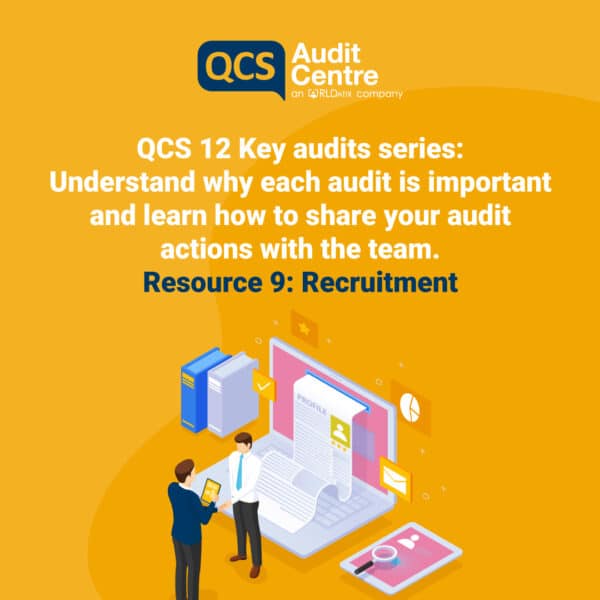Why do we need to complete audits?
To achieve good governance in your service you must demonstrate continuous quality improvement. To do this, auditing and documenting the effectiveness of the processes and systems you have in place, and taking time to observe and document how people experience your service, is essential.
Auditing and action plans offer evidence of the great care you provide. Where improvements are needed, they allow you to demonstrate openly and clearly how you plan to make the changes required that you have identified.
Recruitment: the case for auditing
If your business carries out recruitment activity on a regular basis, it is important to take time to step back and review what is working, what doesn’t work and how you can improve.
Given that there is currently a shortage of candidates in the care sector and competition to attract the best individuals is high, not to mention that recruiting can be expensive, it is vital that your hiring process is performing effectively.
If businesses fail to review the strengths and weaknesses of their recruitment process on an ongoing basis, they are likely to be repeating the same bad patterns, wasting time and money, as well as missing out on high level candidates.
Therefore, a well-structured recruitment audit helps you to:
- Understand your current recruitment process in detail
- Measure its effectiveness for your business
- Identify where changes can be made to improve efficiency and performance
Recruitment audits are best carried out by the individuals involved in the day-to-day operation of recruitment, including line managers who can give an insight into how past recruitment has worked and whether you are attracting the right candidates, interviewers and HR. If you also engage with external recruiters, you should ask for their input. It is also worth involving the most recent additions to your team to understand how they found the process and whether there are changes or successes that they can feed back on.
At the end of the audit, you will have an in-depth record of your current hiring process and key areas for improvement moving forward.
However, it’s key to ensure that:
- The audit becomes embedded into the recruitment process
- It is valued by all those involved
- It is acted upon
Without these steps, your team will see little change and engagement with the audit process will fall away. However, where individuals can see that their contributions are being put into practice and their views are respected, the audit will become a living document allowing for continuous improvement.
Recruitment: achieving compliance
Audits enable you to provide valid, up to date evidence to the CQC that you are managing the recruitment process effectively and meeting the required regulations such as:
- Regulation 17: Good governance
- Regulation 18: Staffing
- Regulation 19: Fit and proper persons employed
Findings: what does the recruitment audit tell you?
Example 1: The audit reveals candidates have a poor recruitment experience, you should:
- Review the content and timing of your communications with candidates throughout the process – what was said and how did it come across? Are you clear with the candidate when they should expect to hear from you?
- Ensure you have thought about the whole process and put yourself in the shoes of the candidate. For example, when you invited them to interview, did you:
- Let them know who they will be meeting?
- Tell them exactly where to go?
- Explain the dress code?
- Let them know what to bring?
- Let them know what to expect? (i.e. are there competency based questions)
- Tell reception to expect them and where they should be directed to?
- Can you make better use of calendar reminders and email templates to ensure that nothing is missed and timescales do not slip?
Example 2: The audit reveals the interviewers are worried about discrimination when asking questions to candidates, you should:
- Ensure all staff involved in the recruitment process have had diversity, equality and inclusion training (and that they continue to receive it at regular intervals throughout their employment).
- Make sure that your interviewers have a good understanding of your diversity, equality and inclusion or recruitment policy.
- Ideally, all shortlisted candidates should be asked the same interview questions and their answers marked against an agreed scoring matrix. Questions should be agreed in advance as part of your standard recruitment process.
- Questions about a candidate’s personal life (such as whether they plan to have children) or questions that are not relevant to the job should be avoided. If a member of the interview panel asks an inappropriate question, the chair should intervene and tell the candidate that they do not need to answer it.
So, what happens next?
Effective auditing can encourage providers and staff to have confidence in your process and in turn foster an open and transparent culture, where staff feel comfortable reporting concerns and suggestions for improvement, especially if this is part of a no blame culture.
But it does not stop once the audit is complete. Your good governance systems then take over creating an environment where learning and improvement thrive, benefiting the safety and well-being of those receiving care and support.
Once you have had a chance to review your audits you can then if needed:
- Allocate resources
- Implement prevention measures
- Increase/implement/refresh staff training
- Consider environmental changes
- Consider the use of assistive devices
- Share the findings and actions with the team





